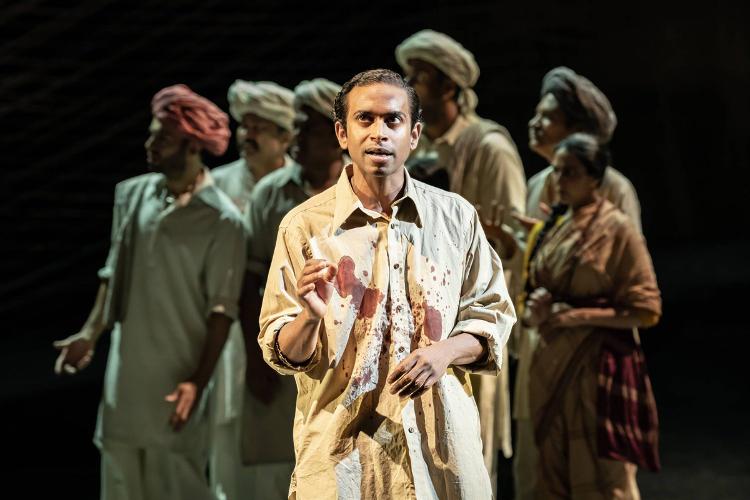'The Father And The Assassin' is a unique take on the story of Gandhi and the period of the Partition of India in 1947, and the terrible events that followed. This story is told from the perspective of the assassin, Nathuram Godse and it is he who leads us through the succession of events of his own life, he who shows us how they link to the current political changes and how this leads to his becoming the killer of 'The Father of India'.
Be prepared for quite a bit of political jargon and facts from the era - there are plenty of acts and legislation mentioned, and you would do well to swot up on your Partition history before you come. The catalogue is fantastically comprehensive and has a political timeline as well as a map, so is certainly worth getting and taking away with you, but it is unlikely you will have time to read this during your pre-play drinks with your friend!
The carving up of the nation of India creates 'Hindustan and Pakistan' (the latter into two parts - 'East and West Pakistan', East Pakistan became Bangladesh in 1971) and a forcible separation and relocation of people based upon their religious beliefs. Generations of Hindus, Muslims, and Sikhs who live peaceably side by side and have for generations are forced to relocate, and in the process many turn on each other. Massacres countrywide in this post-Partition period are brutal - over two million people die including children, and tens of thousands of women are raped and disfigured. 15 million are displaced on both sides of the border. It is a terrible tragedy to befall the Indian people - a bloody episode in India's history.
The young male assassin Nathuram Godse is raised as a girl for superstitious religious reasons, all four of his brothers prior to his birth had died. As a young boy, his parents dress him as a girl and he is made to answer villagers' questions at a makeshift altar - his parents believing 'the goddess speaks through him'. In return, his family are given gifts of food which are welcome as they are poor and rely upon Godse's act as the goddess to feed them. Godse eventually escapes his parents and finds his own path, initially becoming a follower of the beloved peace-loving Gandhi, who he becomes disillusioned with as he does not feel his peaceful ethos is effecting change, and he sees Gandhi's acceptance of all religions as abhorrent. He then meets Hindu nationalist Vinayak Savakar who wants to see bloodshed in order to see change in India. Godse becomes a die-hard Hindu nationalist, seeing Nazism as a blueprint for what needs to happen in India.
Aside from much of the subject matter being bleak, Godse delivers his lines in often humorous ways. His connection to the soon-to-be-arrested and hanged school watchman while he is still a boy is sweet, he seems to get more parental love and care from this man than from his deluded parents. However, as connections go, it doesn't feel like there are many made in the play. Godse comes across as a lost soul in need of direction, and he finds it in obsessively following powerful male leaders.
The music and lighting are dramatic, stopping and starting at opportune moments to great and often startling effect.
As with all the productions at the National, a decent budget equals an impressive stage set. 'The Father And The Assassin' delivers satisfyingly in this regard. The set is impressively sculptural thanks to set designer Rajha Shakiry. A shape emulating a huge curved modernist steel sculpture covers the main ground of the stage, slightly raised in areas, while the backdrop is a vast textile in the process of being weaved. One side is weaved together, the other side is yet to be interwoven. The textile trade was huge in India and it became a particularly contentious issue leading up to Partition, a fact Gandhi drew attention to. Three brass bullet-shaped objects hang pendulously over the stage, partially in shadow yet glinting occasionally in the stage light.
This is a history lesson on the Partition of India, with some fiction thrown into the mix. One does feel the overtones from the playwright as politically lecturing vis-a-vis our current state post-Brexit. However, it is an utterly superb, startling and believable performance by Azan Ahmed as Nathuram Godse in the lead role, at times hilarious, at others terrifying - he received a standing ovation on press night and rightly so. Go and see this if only for Azan Ahmed’s performance.
Review: Lucinda Bennett Photo: Marc Brenner

